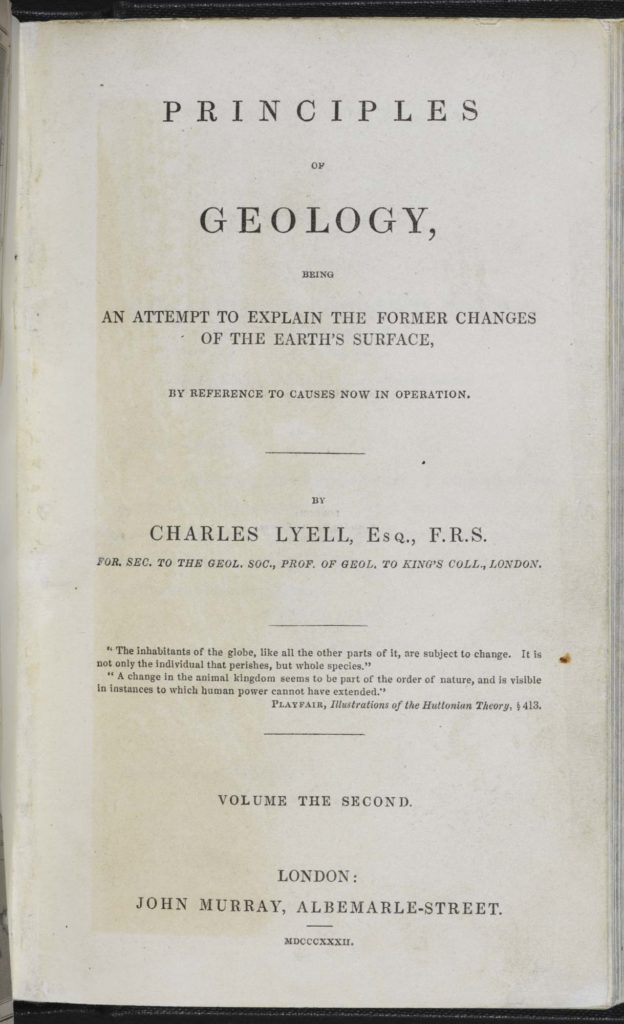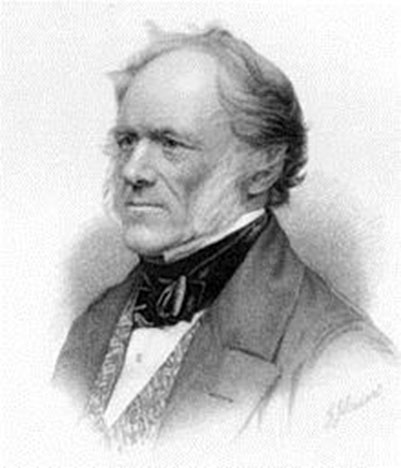Principles of Geology was a groundbreaking work that promoted and popularized James Hutton’s concept of uniformitarianism. It was published by Charles Lyell in three volumes from 1830 to 1833.
The State of Geology Prior to Lyell

Prior to the work of Charles Lyell, the field of geology was still in its infancy. The field as a scientific discipline for the most part lacked a systematic approach. The scientific method of observation and deduction was rarely applied. In addition to the lack of structure, it was heavily influenced by religious interpretations of the Bible and various speculative theories lacking significant evidence to back them.
There were however, a few notable ideas. In the early 19th century, catastrophism was the leading geological explanation of how the Earths features were formed. Catastrophism is the idea that sudden, quick, and violent events shaped the Earth’s features. It is easy to see how catastrophism can be aligned with religious narratives, such as the biblical story of Noah’s flood. Many people, including a few scientists of the day, also believed that the Earth was only a few thousand years old. As with catastrophism, some of this belief was based on religious texts.
A major reason for many of these speculative theories was that the scientific discipline of geology was just beginning and did not have well established principles or regulations. There was a poor understanding of geological formations and how to interpret them. The same went for fossils. The concept of extinction was new and not even widely accepted, so the significance of fossils in reconstructing Earth’s history was not fully recognized.
In this mix of confusion and speculative ideas was the concept of uniformitarianism. Uniformitarianism is the idea which says the physical features of the Earth were transformed by slow, gradual forces, such as erosion and sedimentation, which are still at work today. This idea was first championed by James Hutton, but Charles Lyell was soon to take the baton and run with it.
Principles of Geology
Lyell’s Principles of Geology had a profound impact on the science of geology. The work provided a framework for understanding the Earth’s past based on observable natural processes. One of the more controversial ideas at the time was that it strongly argued for the antiquity of the earth. This idea was met with particularly strong resistance among resistance groups of the day, however the accumulation of scientific evidence has eventually confirmed Lyell’s assertions.
In volume one of Principles of Geology, Lyell offers evidence and lays out his argument for uniformitarianism. In volume two, Lyell extends this principle to organic processes. The third volume is largely a syntax of geology, and he defines four periods of the Tertiary. Here are a few summarized points, taken from all three volumes.
- Uniformitarianism: Lyell argued that the geological processes observed in the present are the same as those that have operated throughout Earth’s history.
- Gradualism: Lyell argued that geological change occurs gradually, over long periods of time rather than by sudden and dramatic events.
- Stratigraphy: Lyell recognized the importance of studying rock layers or strata to understand the sequence of events in Earth’s history.
- Geological Time Scale: Lyell recognized that Earth’s history is extremely long and he divided it into distinct periods based on the fossils found in rock layers.
- Erosion and Uplift: Lyell explained how the geological process of erosion and uplift can gradually shape the surface of the Earth. He highlighted the role of natural forces, such as wind, water, and ice in shaping various features of the Earth such as wearing down mountains and carving valleys.
- Volcanism and Earthquakes: Lyell examined the evidence for volcanoes and earthquakes and provided explanations for their occurrence.
Impact on Charles Darwin
Principles of Geology volume two was one of the few books that Charles Darwin took with him on his famous HMS Beagle voyage, which lasted from 1831 to 1836. Reading this book seeded idea’s in Darwin’s mind that eventually lead to his Theory of Evolution by Natural Selection. The motto of the book was “the present is key to the past” and Darwin took this idea and naturally extended it to biology. The concept of deep time, that the Earth was many millions of years old, had a profound impact on Darwin’s thinking. Gradual changes over long periods of time later became central to his theory of evolution. It wasn’t only Lyell’s idea’s that influenced Darwin, but his behavior and approach to science. Lyell’s emphasis on careful observation and reliance on evidence also shaped Darwin’s scientific approach.
Continue reading more about the exciting history of science!
